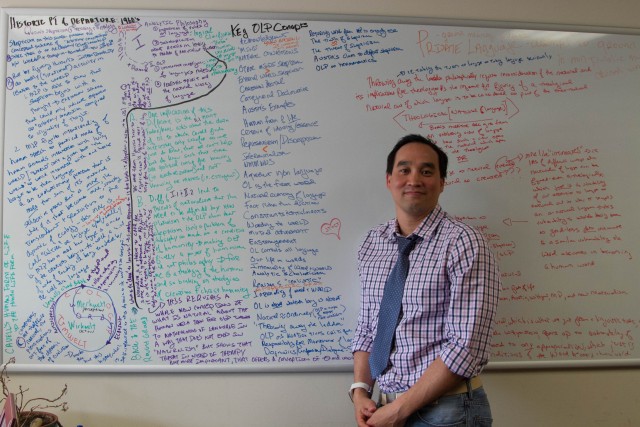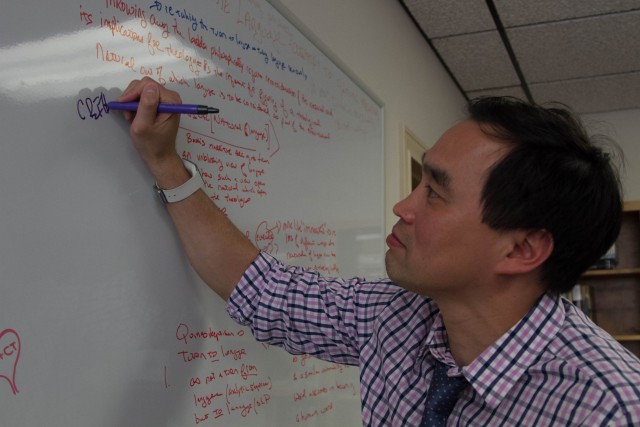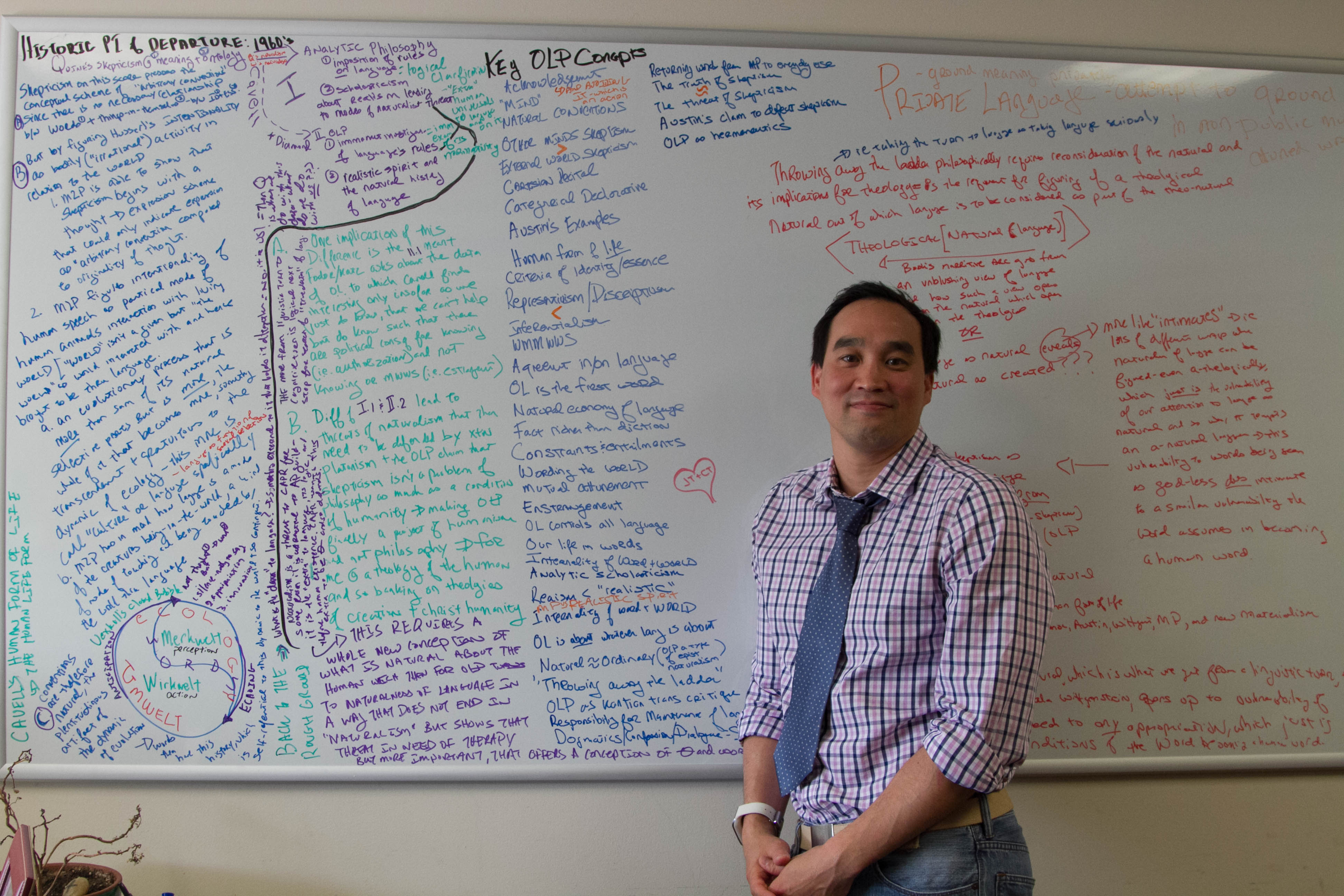 Dr. Jonathan Tran, an associate professor of religion, and his family came to America in 1975 at the end of the Vietnam War when he was a toddler. They left Vietnam in the midst of death and war.
Dr. Jonathan Tran, an associate professor of religion, and his family came to America in 1975 at the end of the Vietnam War when he was a toddler. They left Vietnam in the midst of death and war.
“It affected and devastated everything about my family’s culture. Our family was from the north, and therefore landowners, fairly wealthy and educated, but in the blink of an eye, all that was taken from them,” said Tran.
Tran’s mother was left with the difficulty of raising four kids, who would traditionally have been raised with nannies and servants, on her own.
“The next thing you know, we’re in America,” Tran said. At age 2, Tran would be growing up in a world totally different from what he would have experienced in Vietnam.
“The Emergency Immigration Act allowed 10,000 American-friendly Vietnamese to come over, and I think within a matter of 30 days, 140,000 people came to America,” he said. “America was ill-prepared for this insurgence of immigrants, especially war refugees. I think that gives a good context for what life was like in my family.”
After only a few years in the United States, Tran’s brother died crossing the street in front of the family’s house.
Tran witnessed his death.
“That’s the first thing I remember in life, so life was kind of like that. You throw in the combination of being a political refugee and the realities of poverty and racism … those are pretty difficult realities,” Tran said.
Over the next years, Tran grew up in a household greatly affected by poverty and myriad of other difficulties, including moving several times.
 “Moving is an incredibly traumatic thing for little kids. So it was a lot of loneliness, and all of us were in the same boat, so it wasn’t like we were able to be great resources for each other,” Tran said.
“Moving is an incredibly traumatic thing for little kids. So it was a lot of loneliness, and all of us were in the same boat, so it wasn’t like we were able to be great resources for each other,” Tran said.
“I think we were all just trying to survive. And my mom was working multiple jobs to take care of us, and that is why, to this day, I think she’s our hero, my hero.”
He wrote his first book on time and war, and he dedicated it to his mother.
“I realized while I was writing that book that the Vietnam War, that was her story, more than mine.”
Tran and his family moved 14 times before he went to high school. He dealt with a lot of bullying during his elementary and high school years, both for always being the new kid and for being Asian in non-Asian communities, which was especially hurtful to Tran.
“That was pretty rough, because if the one identifying thing that you can make sense of is your family, and the way you distinguish your family from other people, is ‘they’re Asian,’ if that becomes the chief point of violence against you, then that’s a pretty hard way to negotiate who you are in the world.”
Tran learned to fight as a result of the bullying against him, and he had to fight a lot.
“When I became a Christian, that was one of the hardest things to overcome, not fighting. Or just learning to be a peaceable person,” he said.
Tran became Christian at age 19, early on in his undergraduate years.
“I became Christian at about the same time, and maybe because of that I started to actually begin to think about my world and think about my life in it.”
During his undergraduate years at University of California at Riverside, Tran found friends, stability and a chance to form his identity.
“College is an important time to emotionally come to terms with who you are, and, more importantly, who you’re not,” he said. “I thought my life ought to matter in some way to God and the world. I realized — I have a brain, I ought to use it.”
After college, he did full-time ministry for five years.
“I didn’t know what in the world to do, so I went to Christian seminary, and then, not surprisingly, three years later I still didn’t know what to do, so I applied to graduate school,” he said.
After graduating from Duke with a doctorate in theology & ethics, he came to Baylor. Tran will have been here for 10 years this fall.
Tran is the faculty-in-residence in Dawson-Allen Hall, home to the Leadership LLC. He is assistant director of University Scholars, sits on the faculty of the Renaissance Scholars Program, and teaches undergraduate and graduate religion courses.
“I’ve been fortunate to do be able to do a lot of things at Baylor,” he said. “Probably the thing I’m the oost proud of is I think students like me, so just being able to come alongside students and hear about their stories, how they figure out who they are and why they matter … that’s probably the thing I count as my greatest accomplishment.”
He is assistant director of University Scholars, sits on the faculty of the Renaissance Scholars Program and teaches undergraduate and graduate religion courses.
“I’ve been fortunate to do be able to do a lot of things at Baylor,” he said. “Probably the thing I’m the most proud of is I think students like me, so just being able to come alongside students and hear about their stories, how they figure out who they are and why they matter … that’s probably the thing I count as my greatest accomplishment.”
One such student is Purdon junior Makenzie Fitzgerald, a University Scholars student who met Tran through the Lead LLC at Dawson-Allen.
“He’s one of those people who, once he cares about you, he inserts himself as much as he can into your life to try to love you and take care of you,” she said. “Dr. Tran is one of the best humans I know.”
Fitzgerald wants to be a professor someday, and she’s been very inspired by Tran’s ability to balance being a professor, researcher, husband and father while still being there for students and being involved in the world as a Christian.
“He somehow does it all,” she said. “It gives me some hope that maybe it’s possible. If I’m half the professor that Dr. Tran is someday, then I will be very happy with how my life has turned out.”
Fitzgerald said Tran’s involvement with students is “incredibly refreshing,” citing his intentionality, his willingness to be vulnerable, and how deeply he cares as key aspects of his character that make him the great mentor he is.
“He’s brilliant and he has an extraordinary background, but none of that matters if he isn’t using them to care for people, but he is, and that’s what makes him extraordinary,” she said.
Tran’s passion for forming close friendships with students, colleagues, mentors, family and God has made a difference in his life, so much so that he cites it as his most valuable life advice.
Tran said Christians have a unique way of spending time together that was nothing like anything he experienced before joining the church.
“The thing that is the most important to me is the gift of friendship with people and the world around us,” he said, “and friendship with God keeps me able to keep going on.”
A relationship with God is central to Tran’s everyday life, and he says the place he feels closest to God is the church.
“You know, the church is about as messed up as we know it to be,” he said, “and yet it is evidence that God is real and will take all the time in the world to make us whole, healed, good people.”
Tran said that he loves being at Baylor, as it represents “an amazing moment in the history of American education,” combining elite sports, ambitious academic goals and a Christian lifestyle to create a fantastic school that “understands itself as serving the church.”
Among his friends at Baylor is Jennifer Massey, the assistant dean for Student Learning and Engagement, who has known Tran for several years.
“We’ve served on a variety of different committees together,” she said. “I’ve worked with a lot of faculty on a lot of campuses in three different countries. Dr. Tran is truly exceptional.”
Massey said Tran’s all-in personality is something that she really admires.
“If he is committed to something, he is committed 100 percent to it. He always pushes for excellence. He works incredibly hard; he’s an incredibly passionate person,” she said.
Tran is passionate about the church, his family and his students, among many other things, but particularly has a heart for diversity.
“We have such a problematically small percentage of minority faculty. What that means for us is that we’re overburdened with certain tasks but we’re also privileged to have access to certain things,” he said, “and so in my time here … I’ve been given a lot of opportunities, and I’m very grateful for this.”
Although Baylor has over 30 percent non-white students, its faculty is still lacking in that regard.
“Baylor has increasing diversity among its student population, but faculty and staff have not increased along with it,” Massey said. “All of our faculty and staff need to reflect on their own sense of purpose. I think we want a campus that brings people with different perspectives into our community to nurture our students.”
Tran has dealt with the results of the lack of diversity as a minority faculty, including the assumption that he teaches math because he’s Asian.
“While we have a good number of minorities on this campus, we’re still a pretty politically naïve place,” Tran said. “I worry about whether we’ll move forward in the area of cultural competency.”
 Having a minority as a professor and a mentor has helped students like Fitzgerald expand their worldview and have a more open mind.
Having a minority as a professor and a mentor has helped students like Fitzgerald expand their worldview and have a more open mind.
“It really informs my understanding of how much universities still have to grow,” she said.
Fitzgerald thinks Baylor could benefit from having more professors like Tran.
“He has a heart for not only racial issues, but women who are oppressed, people who are first generation, people who are in poverty … he cares so deeply for anyone who needs it, and I think that that has helped me love Waco more, that’s helped me be a better person all around,” she said.
In the fall, Tran will be transitioning from Dawson-Allen to the Honors Residential College. As far as other plans go, Tran says he has no idea what the future holds.
“I’ll keep on in the department of religion, the Honors Residential College and go on from there,” he said. “I’ll still be raising kids on campus, which is a tremendous opportunities but comes with its challenges.”
Massey said moving to the Honors Residential College is a good move for Tran.
“The Honors Residential College is a great decision for him and an amazing decision for the HRC,” Massey said.
Fitzgerald said he agreed Tran is a good fit.
“Dr. Tran’s story is very inspirational, but I think that who he is and how he lives his life is even more so,” said Fitzgerald.
Story by: Jenna Press | Assistant City Editor
Photos by: Hannah Haseloff | Lariat Photographer






